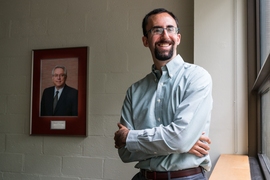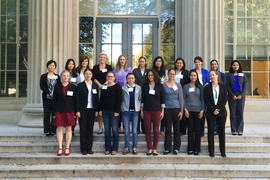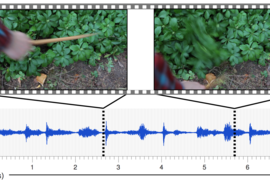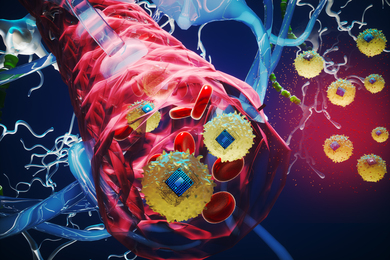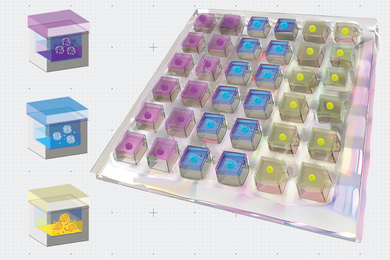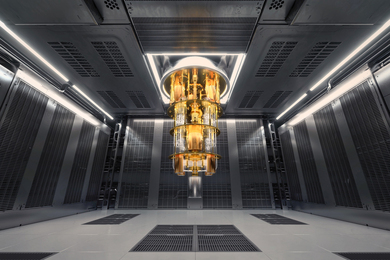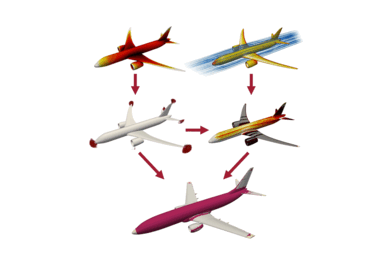The School of Engineering has announced the addition of 16 new faculty members to its departments, institutes, labs, and centers during the 2017-18 and 2018-19 academic years. With research and teaching activities ranging from personalization in the microbiome to the application of machine learning to naval architecture, they are poised to make vast contributions in new directions across the school and to a range of labs and centers across the Institute.
“I am pleased to welcome our exceptional new faculty. Their presence will enhance the breadth and depth of education and research within the School of Engineering, and strengthen MIT’s commitment to making a better world,” says Anantha Chandrakasan, dean of the School of Engineering. “I look forward to their contributions in the years to come.”
The new School of Engineering faculty members are as follows:
Bryan Bryson will join the Department of Biological Engineering as an assistant professor in the summer of 2018. Bryson earned a BS in mechanical engineering, with minor in biomedical engineering, and a PhD in biological engineering from MIT; his doctoral thesis was on proteomics and systems biology. He is currently completing postdoctoral work at the Harvard School of Public Health and the Ragon Institute, developing single-cell transcriptomic and proteomic methods for analysis of microbe-host interactions in the pathogenesis of tuberculosis. Bryson’s research program will center on systems biology approaches to infectious disease, primarily tuberculosis, and his teaching will include 20.440 (Analysis of Biological Networks), a graduate core subject on the analysis of biological networks, and 20.309 (Instrumentation and Measurement for Biological Systems), an undergraduate core laboratory subject on instrumentation and measurement for biological systems. Bryson served as a student representative on MIT’s last presidential search committee and was the recipient of numerous student awards at MIT, including the Hugh Hampton Young Fellowship for the combination of academic achievement with exceptional personal character.
Luca Carlone joins the Department of Aeronautics and Astronautics as the Charles Stark Draper Assistant Professor this month. He will also be a principal investigator in the Laboratory for Information and Decision Systems (LIDS). Carlone received his PhD from the Polytechnic University of Turin in 2012, with a thesis entitled “Nonlinear Estimation Techniques for Autonomous Navigation in Single and Multi-robot Systems.” A research scientist at LIDS since 2016, Carlone first came to MIT as a postdoc in 2015, after two years as a postdoc at Georgia Tech. Carlone’s research interests include nonlinear estimation, numerical and distributed optimization, and probabilistic inference applied to sensing, perception, and decision making in single and multirobot systems. He is the recipient of several best-paper awards in his field.
Sili Deng will join the Department of Mechanical Engineering as an assistant professor in January 2019. She received her PhD from Princeton University in 2016 and is currently doing postdoctoral work at Stanford University. Deng works in the area of combustion, with a focus on understanding flame dynamics and emissions during combustion processes. She performed both modeling and experiments to understand, characterize, and detect non-premixed cool-flame behavior for the first time, and she experimentally elucidated the sooting limits of diesel and biofuel surrogates in a simple liquid stagnation flow. She also investigated soot evolution in turbulent flames via modeling to provide insights into understanding both chemical and hydrodynamic effects on soot emissions. Deng has received several awards including the Bernard Lewis Fellowship from the Combustion Institute, the Gordon Wu Prize for Excellence from Princeton, which also awarded her an excellence in teaching award.
Rafael Gomez-Bombarelli will join the faculty in the Department of Materials Science and Engineering as an assistant professor in January 2018. He received a BS, MS, and PhD in chemistry from the University of Salamanca in Spain, followed by postdoctoral work at Heriot-Watt University and Harvard University. He is currently a senior researcher at Kyulux NA, applying Harvard-licensed technology to create commercial organic light-emitting diode products. Gomez-Bombarelli’s research has evolved from experimental mechanistic studies of organic molecules with an emphasis on environmental toxicity, to computer-driven design of molecular materials. By combining first-principles simulation with machine learning on theoretical and experimental datasets he aims to accelerate the discovery of novel practical materials. At MIT he plans to address the role of molecular transformation in materials discovery in areas such as catalyst design, the environmentally-minded development of novel and replacement chemicals, and designing for stability in advanced materials. Honors presented to Gomez-Bombarelli include the Spanish accreditation for Profesor Ayudante Doctor, and the University of Salamanca’s doctoral thesis award. His work has been featured in MIT Technology Review and The Wall Street Journal. He was also co-founder of Calculario, a materials discovery company that leverages quantum chemistry and machine learning to target advanced materials in a range of high-value markets.
Song Han will join the Department of Electrical Engineering and Computer Science as an assistant professor in July 2018. He received his master’s degree and PhD in electrical engineering from Stanford. His research focuses on energy-efficient deep learning at the intersection of machine learning and computer architecture. Han proposed the deep compression algorithm, which can compress neural networks by 17 to 49 times while fully preserving prediction accuracy. He also designed the first hardware accelerator that can perform inference directly on a compressed sparse model, which results in significant speed increases and energy saving. His work has been featured by O’Reilly, TechEmergence, and The Next Platform, among others. Han has won best-paper awards at the International Conference on Learning Representations and the International Symposium on Field-Programmable Gate Arrays.
Phillip Isola will join the Department of Electrical Engineering and Computer Science as an assistant professor in July 2018. He received a bachelor’s degree in computer science from Yale University and a PhD in brain and cognitive sciences from MIT. Currently a fellow at OpenAI, Isola studies visual intelligence from the perspective of both minds and machines. He received a National Science Foundation (NSF) graduate fellowship as well as an NSF postdoctoral fellowship.
Tim Kraska will join the Department of Electrical Engineering and Computer Science as an associate professor in January 2018. Currently an assistant professor of computer science at Brown University, Kraska received a PhD from ETH Zurich, then spent three years as a postdoc in the AMPLab at the University of California at Berkeley, where he worked on hybrid human-machine database systems and cloud-scale data management systems. He focuses on building systems for interactive data exploration, machine learning, and transactional systems for modern hardware, especially the next generation of networks. Kraska was recently selected as a 2017 Alfred P. Sloan Research Fellow in computer science. He has also received an NSF CAREER Award, an Air Force young investigator award, two Very Large Data Bases conference best-demo awards, and a best-paper award from the IEEE International Conference on Data Engineering.
Mingda Li will join the Department of Nuclear Science and Engineering as an assistant professor in January 2018. He completed his BS in engineering physics at Tsinghua University in 2009 and his PhD in nuclear science and engineering at MIT in 2015. After that, he carried out research as a postdoc at MIT’s Department of Mechanical Engineering. His Energy Nano Group aims to utilize defects to improve material performance through defect engineering, including experimental and theoretical studies on functional extended defects, controllable defective single crystal growth, AI-aided spectroscopy for defect resolution, and nanoscale energy transport and conversion processes with the presence of defects.
Tami Lieberman will join MIT as an assistant professor with dual appointments in the Department of Civil and Environmental Engineering and the Institute for Medical Engineering and Science in January 2018. Lieberman earned a BA in molecular biology and genetics at Northwestern University, where she was awarded a Barry M. Goldwater Scholarship. She earned a PhD in systems biology from Harvard, where she developed new genomic approaches for understanding how bacteria evolve during infections of individual people. Lieberman is currently a postdoc in Eric J. Alm’s lab at MIT, where she has further developed and applied genomic approaches to understand the microbes that colonize the human body. She will lead a computational and experimental research group focused on uncovering the principles governing colonization, niche range, and personalization in the human microbiome. Lieberman has also made contributions to our understanding of antibiotic resistance, including the co-invention of a new platform for visualizing evolution in real time.
David Des Marais joined the Department of Civil and Environmental Engineering as an assistant professor in October. He received his BA in integrative biology from the University of California at Berkeley, in 2000, studying plant diversity and evolution, and a PhD in biology from Duke University. His dissertation addressed how multifunctional proteins evolve within and between species. Des Marais did postdoctoral research at the University of Texas at Austin, where he was awarded a fellowship from the U.S. Department of Agriculture’s National Institute of Food and Agriculture to investigate plant responses to multiple environmental stresses experienced concurrently. Most recently, he was a principal investigator in the Department of Organismic and Evolutionary Biology at Harvard, as well as a senior fellow at the Arnold Arboretum. Des Marais’ research interests are in plant ecophysiology, evolutionary biology, and functional genomics. He is particularly interested in plant interactions with the abiotic environment — water, temperature, nutrients, and light — and how plants respond when these factors impose stress. He studies natural diversity within and between plant species both in the field and in controlled environments, and he hopes to develop a mechanistic understanding or plant performance to conserve natural plant populations and to improve agricultural productivity and sustainability.
Farnaz Niroui will join the Department of Electrical Engineering and Computer Science (EECS) as an assistant professor in January 2019. She received her PhD and master’s degrees in electrical engineering from MIT and a bachelor’s degree in nanotechnology engineering from the University of Waterloo. She is currently a Miller Postdoctoral Fellow at the University of California at Berkeley. Her research integrates electrical engineering with materials science and chemistry to develop hybrid nanofabrication techniques to enable precise yet scalable processing of nanoscale architectures capable of uniquely controlling light-matter interactions, electronic transport, and exciton dynamics to engineer new paradigms of active nanoscale devices. During her graduate studies, Niroui was a recipient of the Engineering Research Council of Canada scholarship, and she was selected for the Rising Stars program in EECS at MIT in 2015 and in 2016 at Carnegie Mellon University.
Desiree Plata will join the Department of Civil and Environmental Engineering as an assistant professor in July 2018. She earned her bachelor’s degree in chemistry from Union College in Schenectady, New York, in 2003, and her PhD in chemical oceanography and environmental chemistry from the MIT-Woods Hole Oceanographic Institution’s joint program in oceanography in 2009. Plata is currently the John J. Lee Assistant Professor of Chemical and Environmental Engineering at Yale and associate director for research at the Center for Green Chemistry and Green Engineering at Yale. Previously, she was in the civil and environmental engineering department at Duke, where she was active in several international research networks, such as the EPA-funded LCNano (studying the environmental implications of nanomaterials across the life cycle) and the NSF-funded Partnership for International Research and Education, studying water and commerce as related to the energy sector. Plata’s work is in the area of environmental chemistry, with applications in minimizing the environmental impact of emerging industries — with a particular focus on nanotechnologies across the energy sector. She has made fundamental contributions to the field of heterogeneous catalysis with respect to the bond-building mechanisms in carbon nanotube synthesis, which can be leveraged to lessen environmental impacts. Her work continues to illuminate novel chemistries that occur during environmental transformation processes of organic molecules. Plata is an NSF CAREER awardee, a National Academy of Engineers Frontiers of Engineering fellow, and a two-time National Academy of Sciences Kavli Frontiers of Science fellow, and was recently recognized for excellence by Caltech’s Resnick Sustainability Institute.
Arvind Satyanarayan will join the Department of Electrical Engineering and Computer Science as an assistant professor in July 2018. He received a bachelor’s degree from the University of California at San Diego and a master’s degree from Stanford — both in computer science — and a PhD in computer science from Stanford, working with the University of Washington Interactive Data Lab. Satyanarayan is currently a postdoc at Google Brain, working on improving the interpretability of deep-learning models through visualization. He focuses on developing new declarative languages for interactive visualization and leveraging them in new systems for visualization design and data analysis. His work has also been deployed on Wikipedia to enable interactive visualizations within articles. Satyanarayan’s research has been recognized with a Google PhD fellowship and best-paper awards at the IEEE InfoVis and the Association for Computing Machinery (ACM) Computer-Human Interaction conference.
Koroush Shirvan joined the Department of Nuclear Science and Engineering faculty as an assistant professor in the fall of 2017. He received his PhD in nuclear engineering from MIT in 2012, where he was also a principal research scientist at the Center for Advanced Nuclear Energy Systems. Shirvan specializes in the development and analysis of innovative nuclear reactor technology. He has led projects involving more than 30 organizations, including national laboratories, universities, and private companies. He is the executive director of the accident tolerant fuel integrated research project, focused on developing the next generation of fuels aimed at improving the severe accident response of nuclear power plants. He is also the co-director of a nuclear reactor technology course for electric utility executives held during summers at MIT. His research will focus on acceleration of nuclear technology innovation by combining multiphysics simulations and informed experimentation in the highly regulated nuclear energy sector.
Julian Shun joined the Department of Electrical Engineering and Computer Science as an assistant professor in September. He received a bachelor’s degree in computer science from the University of California at Berkeley, and a PhD in computer science from Carnegie Mellon University (CMU). Before coming to MIT, he was a postdoctoral Miller Research Fellow at UC Berkeley. Shun’s research focuses on the theory and practice of parallel algorithms and programming. He is particularly interested in designing algorithms and frameworks for large-scale graph analytics. He is also interested in parallel algorithms for text analytics, concurrent data structures, and methods for deterministic parallelism. Shun received the ACM doctoral dissertation award, the CMU School of Computer Science doctoral dissertation award, a Facebook graduate fellowship, and a best-student-paper award at the Data Compression Conference.
Wim van Rees joined the Department of Mechanical Engineering as an assistant professor this fall. He received a BS in marine technology in 2006 and an MS with honors in ship hydrodynamics in 2008 from the Delft University of Technology. In 2014, he earned a PhD in computational science and engineering. He joined Harvard as a postdoc in 2014. Van Rees’ work couples the most advanced computational fluid dynamics and structural mechanics available with modern machine learning to design ocean propulsion and energy harvesting systems by evolutionary optimization. His combined background in naval architecture, including design of an America’s Cup vessel, and advanced computational fluid dynamics is unique. The systems that van Rees develops are inspired by nature, but outperform similar biological systems through simulated evolutionary processes that are able to mitigate some disadvantageous constraints of biological evolution. His work has the possibility of transforming ocean utilization around the world through unconventional approaches to transportation and offshore structure design, including extraction of energy from wind, wave, and turbulence, and marine robotics. The advanced computational tools that van Rees has developed, along with the directions of his research, may also enable him to one day unravel the mysteries of turbulence by developing reliable predictive tools.


